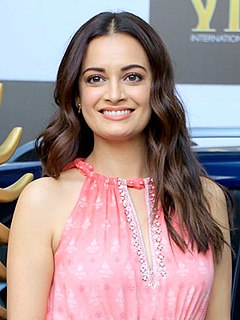A Quote by Dia Mirza
I cannot write a novel because I cannot work in continuity. My works are more abstract, may be, I will try short story writing.
Quote Topics
Related Quotes
Short story writers simply do what human beings have always done. They write stories because they have to; because they cannot rest until they have tried as hard as they can to write the stories. They cannot rest because they are human, and all of us need to speak into the silence of mortality, to interrupt and ever so briefly stop that quiet flow, and with stories try to understand at least some of it.
A short story is a sprint, a novel is a marathon. Sprinters have seconds to get from here to there and then they are finished. Marathoners have to carefully pace themselves so that they don't run out of energy (or in the case of the novelist-- ideas) because they have so far to run. To mix the metaphor, writing a short story is like having a short intense affair, whereas writing a novel is like a long rich marriage.
A short story is confined to one mood, to which everything in the story pertains. Characters, setting, time, events, are all subject to the mood. And you can try more ephemeral, more fleeting things in a story - you can work more by suggestion - than in a novel. Less is resolved, more is suggested, perhaps.
I pretty much drink a cup of coffee, write in my journal for a while, and then sit at a computer in my office and torture the keys. My one saving grace as a writer is that, if I'm having trouble with the novel I'm writing, I write something else, a poem or a short story. I try to avoid writer's block by always writing something.
I'm one of those writers who started off writing novels and came to writing short stories later, partly because I didn't have the right ideas, partly because I think that short stories are more difficult. I think learning to write short stories also made me attracted toward a paring down of the novel form.
I started writing the book without realizing I was writing a book. That sounds stupid, but it's true. I'd been trying and failing to make a different manuscript work, and I thought I was just taking a break by writing some short stories. I'm not a very good short story writer - the amazing compression that is required for short stories doesn't come easily to me. But anyway, I thought I'd try to write some short stories. And a structure took shape - I stumbled upon it.
I always was interested in prose. As a teenager, I published short stories. And I always wanted to write the long short story, I wanted to write a novel. Now that I have attained, shall I say, a respectable age, and have had experiences, I feel much more interested in prose, in the novel. I feel that in a novel, for example, you can get in toothbrushes and all the paraphernalia that one finds in dally life, and I find this more difficult in poetry.
The short story is at an advantage over the novel, and can claim its nearer kinship to poetry, because it must be more concentrated, can be more visionary, and is not weighed down (as the novel is bound to be) by facts, explanation, or analysis. I do not mean to say that the short story is by any means exempt from the laws of narrative: it must observe them, but on its own terms.
I find it's very confusing when one critic tells you one thing and one tells you something completely different. Unless all the critics agree on parts of the play that just didn't work. I have stopped reading reviews, because I find writing is all about courage. You must have courage when you start writing a play and you cannot have the voice - you must write things out. You cannot have the voice of a critic telling you, "That didn't work in that play, you cannot make it work in another play." Every time you do a production, it's an experimentation.
One easy mistake to make with the first novel is to expand the short story. Some things are better as a story; you cannot dilute things into a novel. I think the first hundred pages of a novel are very important. That's where you set things up: the world, the characters. Once you've set that up, it'll be much easier.










































